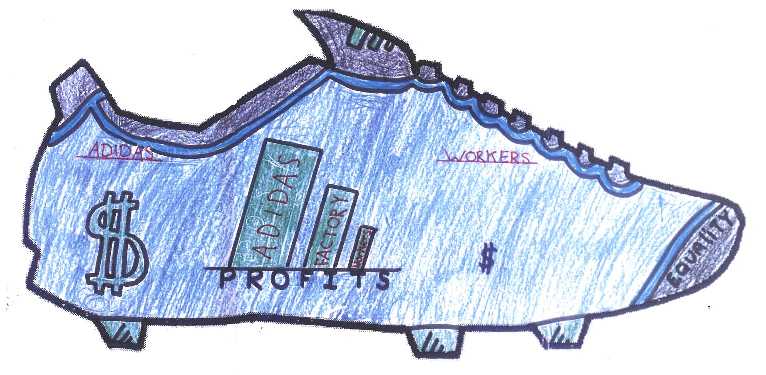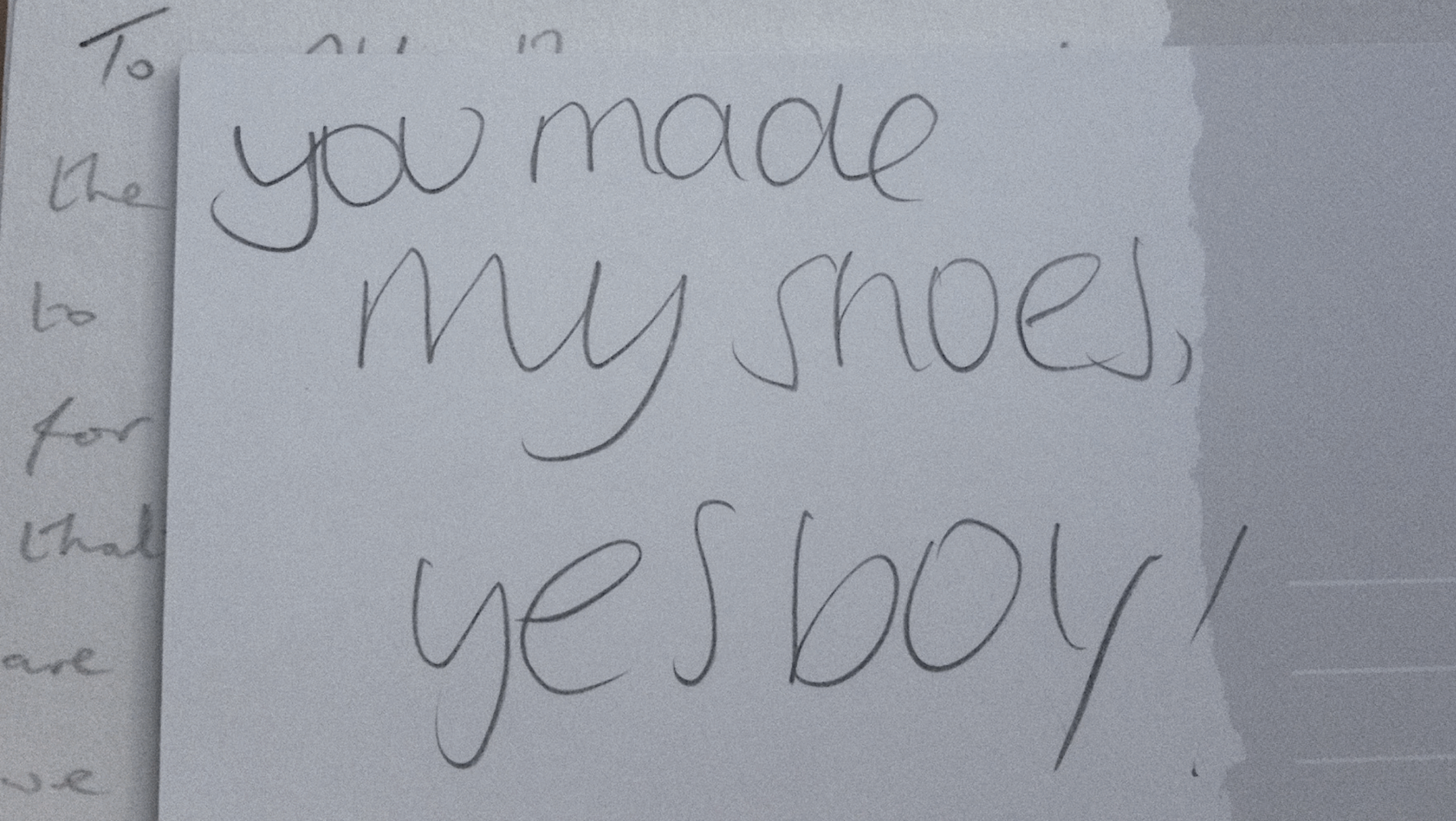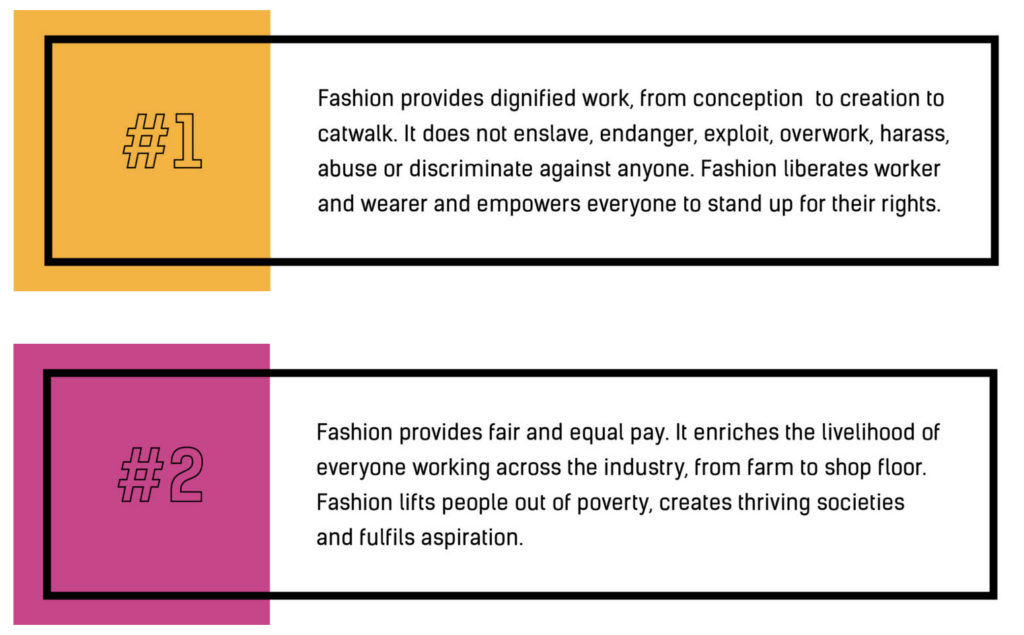
As a parent, I was both proud of the students and very pleased that my child is at a school where he is encouraged to challenge injustice. I was extremely impressed by the depth of knowledge and understanding shown by the students. They clearly felt strongly about the subject and displayed great persistence in their questioning. I thought their actual questions were perceptive and challenging. So much so, they were able to undermine totally, the weak case presented by Adidas.
It was clear from the reactions of the audience, that the issues discussed provoked strong feelings in all of the students that took part. They were disgusted by the attitude of the offending companies, and the lack of sympathy that was portrayed.
The [football boot] drawings are tremendous and I would like to do a story on how the kids got involved with this project and how you can see their alternative adidas posters online.
Source: discussion / responses to the Channel 4 TV show ‘Mark Thomas Comedy Product S5 E4 ‘Pester Power’’ (see here).
Resources for educators
On this page, we share creative and engaging ways in which educators can introduce the geographies of trade (in)justice to their students.
The followthethings.com project began in the classroom and, from the start, took a material culture – thing – approach to teaching and learning about trade (in)justice (see Angus et al 2001, Cook et al 2007, Hawkins et al 2011, Evans et al 2013, Anon 2014, Cook et al 2017). This starts with a simple question – who made my stuff? – in the home that this will encourage trade justice to matter to everyone personally. Inspired by the political philospher Iris Marion Young (2003), however, we avoid engaging students (and wider audiences) with the trade injustices thay often find through ‘blame, shame & guilt‘. Instead, our aim for trade justice education is for it to be positive, collaborative, future-oriented solidarity-building and world-making.
We follow the pedagogical mantra of the Fashion Revolution movement, encouraging students to ‘Be Curious. Find Out. Do Something’. We ask students to start with commodities that are part of their lives and identities. We ask them to think about what these commodities bring to their lives (e.g. fitting in, keeping in touch, etc.). We then ask them to think about the supply chain workers who make those commodities and help them to be who they are, and to live the lives they live.
The idea is to ‘Pop the bubble‘ of consumer culture, and then to encourage discussion about what happens when you see and make connections with workers worldwide. We start by addressing our students (and wider audiences) as ‘consumers’ but then try to pivot towards addressing them as ‘citizens’ and/or ‘activists’ of one form or another.
We provide advice and guidance for researchers who want to do this ‘follow it yourself’ detective work themselves on another page. Below we provide a) the best prompts we have found for introducing trade (in)justice to the classroom, b) five classroom resources that we have created with and for trade justice activist organisations which dovetail nicely with the content of our website, c) a unique example of trade justice education where an adidas brand executive, an Indonesian factory inspector and a politician were quizzed in person by students in their classroom.
a) classroom prompts
Because the true meaning of consumption is Christmas, there’s no better ‘who made my stuff?’ classroom prompt than this short ‘Jingle Bells’ video. Play it to your class and discuss:
All year round, the paired-up advertising and trade justice videos below can quickly show students how relationships between producers and consumers are hidden by corporations and revealed by activists in different ways. You could show one or both of these video pairs in class to prompt a discussion about issues of trade justice in supply chains.
b) our resources
Traces Of Labour Video Series
x Fashion Revolution / University of Exeter / Futurelearn
Written & narrated by Ian Cook
Prompt videos | All ages | No subject specialism

‘What would you say to the person who made your …?’
x Eden Project
Written by Ian Cook et al
Quick ice breaker activity | All ages | No subject specialism
Fashion Transparency Trump Card Game
x Fashion Revolution & x Fashion Revolution Brazil
Multiple authors
Longer ice-breaker activity | All ages | No subject specialism | resources available in English & Portuguese
How To Run A Subvertisement Workshop
x Eettisen kaupan puolesta ry (Pro Ethical Trade Finland)
Written by Eeva Kemppainen
Creative activity | All ages | Geography & Media Studies | Resources available in English & Finnish

RECYCOOL Imperfections Online Course
2023 x Fashion Revolution Slovakia & Czech Republic
Written by Ian Cook & Martina Mareková Kuipers
Free online course | Senior school, university & public-facing | Based on the 10-point Manifesto for a Fashion Revolution | No subject specialism
c) when trade (in)justice came to class
‘Pester Power’
17 minute TV comedy show video starring Mark Thomas (comedian), Noel Jenkins (geography teacher), Noel’s students, David Husselbee (adidas Global Director of Social and Environmental Affairs), Richard Howitt (Member of European Parliament), Endang Rokhnai (Urban Community Mission in Indonesia which inspects factories), and Tatiana Lukman (translator).
Discussion prompt | All ages | No subject specialism
Sources
Tim Angus, Ian Cook & James Evans (2001) A manifesto for cyborg pedagogy? International Research in Geographical and Environmental Education 10(2), 195-201
Anon (2014) ‘Follow The Things’: developing critical pedagogies to promote geographically-informed and ethically-aware consumption in school geography curriculum. https://impact.ref.ac.uk/casestudies/CaseStudy.aspx?Id=36401 [last accessed 29 January 2025]
Ian Cook et al (2024) iPhone 3G – Already With Pictures! (aka ‘iPhone Girl’). followthethings.com/iphone-3g-already-with-pictures-aka-iphone-girl.shtml (last accessed 29 January 2025: the example referred to in one of the ‘Traces of Labour. videos)
Ian Cook et al (2018) From ‘Follow the thing: papaya’ to ‘followthethings.com’. Journal of Consumer Ethics 1(1), 22-29.
+7 sources
Ian Cook & Tara Woodyer (2012) Lives of things. in Eric Sheppard, Trevor Barnes & Jamie Peck (eds) The Wiley Blackwell companion to economic geography. Oxford: Wiley-Blackwell, 226-241 (includes discussion of the ‘CSI’ kit discussed in one of the ‘Traces of labour’ videos)
Ian Cook, James Evans, Helen Griffiths, Rebecca Morris, Sarah Wrathmell et al (2007) ‘It’s more than just what it is’: Defetishising commodities, expanding fields, mobilising change… Geoforum 38(6), 1113-1126
James Evans, Ian Cook & Helen Griffiths (2013) Creativity, Group Pedagogy and Social Action: A departure from Gough. Educational Philosophy & Theory 40(2), 330-345
Kity Hauser (2004) A garment in the dock or, how the FBI illuminated the prehistory of a pair of denim jeans. Journal of material culture 9(3), 293-313 (the paper referred to in one of the ‘Traces of Labour’ videos)
Harriet Hawkins, Shelley Sacks, Ian Cook, Eleanor Rawling, Helen Griffiths, Di Swift, James Evans, Gail Rothnie, Jacky Wilson, Alice Williams, Katie Feenay, Linzi Gordon, Heather Prescott, Claire Murphy, Daniel Allen, Tyler Mitchell, Rachel Wheeldon, Margaret Roberts, Guy Robinson, Pete Flaxman, Duncan Fuller, Tom Lovell & Kye Askins (2011) Organic Public Geographies: ‘Making the Connection’. Antipode 43(4), 909-926
University of Glasgow Adam Smith Business School (2016) Why Ethical Consumption? With Professor Ian Cook, University of Exeter. https://www.youtube.com/watch?v=-CY686xLKHQ [last accessed 29 January 2025]
Iris Marion Young (2003) From guilt to solidarity: sweatshops and political responsibility. Dissent 50(2), 39-44
image credit
Boot: credit Juicy Geography (modified September 2025)
Manifesto points: credit Fashion Revolution
![]()


